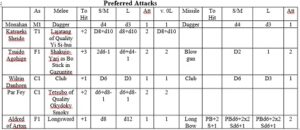This is RPG-ology #60: Spreadsheets, for November 2022.
We began a sort of miniseries specifically focusing on tips for running games. There is a sense in which this entire RPG-ology series is about game tips, but with the entry #58: Random Encounters we recognized this as a more focused collection on the subject, and noticed that the not-long-previous entry #56: Voices was perhaps coincidentally similar, so this month we are continuing with another idea.

Back in the early 80s when I started play as an Original Advanced Dungeons & Dragons® dungeon master I was constantly asking my players questions about their character sheets. What weapon are you using? Do you have bonuses to hit? How many hit points do you have? What’s your armor class? And it wasn’t just in combat. What’s your chance to hear a noise, to unlock a door, to kick one open? Do you have torches, lanterns, rations, water, oil, rope? Presumably I could have made copies of their character sheets, but I didn’t have a photocopier and they were all hand-written.
Eventually I got a Commodore 64 computer 512K memory expansion, a floppy drive, word processing software, and an Okimate 20 printer. (That might be nostalgic for some of you.) I was able to save copies of character papers–but since the computer used the family television for a monitor, I couldn’t use it at the dining room table where I hosted games, let alone at the homes of the other players where we sometimes played. I could print duplicate character papers, but they were updated every session, and that printer was rather expensive to operate. Besides, character papers were getting longer with each new supplemental core rule book–non-weapon proficiencies, weapon specialization, and more race and class details. It was a lot of papers, and in some sense it was less organized for me to be looking for papers I had than it was for me to have players hand me their copies.
I don’t know when I hit on the idea of using spreadsheets, but it streamlined a lot of play in that game and I still use them today. I make most of them in a word processor, but for some purposes I use a spreadsheet program.
As you might be able to tell from the image, I use several short spreadsheets. The one pictured gives me all the essential combat attack information–combat chart and level, preferred melee and missile weapons, bonuses to hit against various targets, number of attacks, and damage. On my printout, the next one gives me the defensive information: hit points and base armor class with all adjustments and a final “normal armor class” total.
Yet it doesn’t end there. I have a sheet of ability scores; one of saving throws with variants; the numbers for my house rules leadership system; miscellaneous info such as alignment, reactions, height, weight; several panels giving odds for thief skills with adjustments for those characters who have them; encumbrance and movement; weight and mounted weight; experience; weapon and non-weapon proficiency information; expendable equipment such as arrows and other missiles, oil, lights, spikes, stakes, rations, water, holy water, plus the unusual items like garlic, tinderboxes, and cash; abilities against undead; spells available; languages (does anyone here speak hobgoblin?); and experience points.
I mentioned using a spreadsheet program. I use these to calculate divisions of experience and treasure at the ends of adventures, and sometimes to create hordes of monsters, but I don’t usually print these as they’re more work product than useful in-game references.
I certainly don’t think every referee will find all of my tables useful; indeed, I don’t always find them all useful in individual games. For example, in my last game the party had a druid and a shukenja, so they had healing, but no one with the power to dispel undead. Regretably the game dissolved before they discovered that oversight, but I had the chart, empty, on the spreadsheets against the possibility that they might recognize the need and recruit someone to fill the gap.
So perhaps something here will help you streamline your games, even if you don’t play Original Advanced Dungeons & Dragons®. I’ve adopted the use of spreadsheets to being a party leader in a Star Frontiers® game, and to running my online Multiverser™ games, and I suspect nearly any game can benefit from a system that puts character information at the fingertips of the person who needs it.
Previous article: David.
Next article: Procession.
